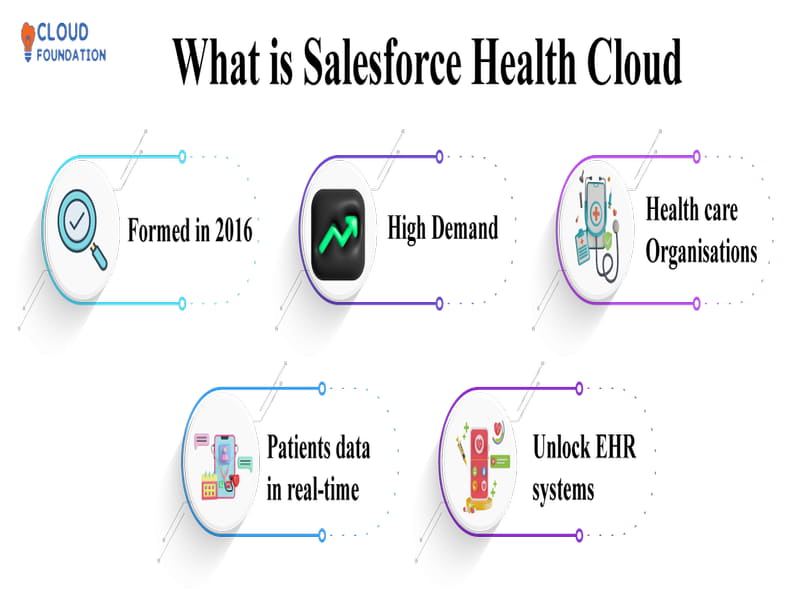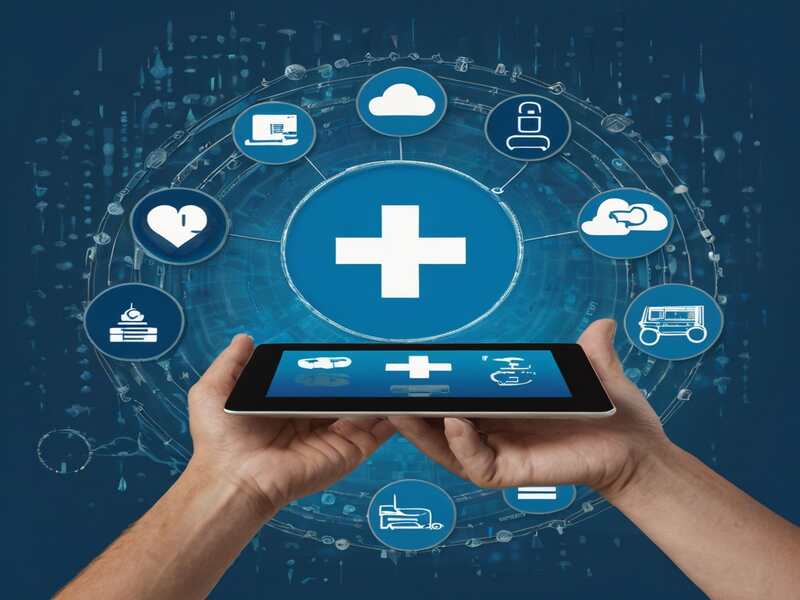What is Salesforce Health Cloud
What is Salesforce Health Cloud
Salesforce Health Cloud is an enterprise resource planning solution used for healthcare businesses of any scale, from small clinics and practices to hospitals with thousands of beds. It also streamlines communication among healthcare organisations, such as insurance providers.
Patient 360 provides users access to patient records such as electronic health records, laboratory information, prescriptions, and medical histories. To maximise learning about Salesforce Health Cloud, the speaker suggests taking part in certification testing and accessing its Trailhead to become certified and gain more insights.

Salesforce Health Cloud is an industry-specific solution designed for healthcare organisations on the Salesforce Platform. It fully exploits all its features, customisations, and functionality but is tailored specifically for healthcare.
This capability, composed of critical components, including Sales Cloud, Service Cloud, Community Cloud, Marketing Cloud, MuleSoft, and Einstein, helps manage communication channels such as case portals, requirements, marketing requirements, integrations, and AI.
Salesforce Health Cloud is an enterprise IT-R&M system that helps healthcare organisations manage patient relationships and their respective records.
Patient profiles, collaborative care networks and health timelines, patient data from electronic health records (EHR), and third-party sources like medical devices and wearables are vital in inpatient healthcare management.
Integrating the health system’s EHR and Patient Monitoring Platform provides a holistic and real-time view of every patient.
Salesforce Health Cloud empowers healthcare providers to prioritise tasks, segment patient populations, and map caregiver networks more efficiently than ever. Used by organisations in healthcare, life sciences, provider payers, health systems, and pharmaceutical/medical device businesses, Salesforce Health Cloud is an exceptional way of prioritising tasks while meeting patient care objectives efficiently and cost-effectively.
Salesforce Health Cloud allows businesses and healthcare practitioners to customise reports and dashboards, while mobile platforms enable secure communication.
Define Salesforce Health Cloud
Salesforce Health Cloud is an industry-specific CRM designed specifically for healthcare. This platform allows healthcare providers to centralise patient data management, interactions, and engagement efforts on one convenient platform.
This platform utilises Salesforce CRM as the backbone, connecting seamlessly with electronic health records (EHR) systems to give healthcare practitioners an overarching picture of patients’ medical histories, appointments, and communication histories.
Salesforce Health Cloud also includes patient engagement tools, analytics and automation features designed to enable healthcare organisations to enhance patient care delivery while streamlining operations and enriching patient experiences.
Salesforce Health Cloud also meets healthcare regulations like HIPAA to create a safe environment for handling sensitive patient information.
Overview of Salesforce Health Cloud
Salesforce Health Cloud is an all-inclusive customer relationship management (CRM) system tailored to healthcare organisations. With features and functionalities explicitly tailored for this industry, healthcare organisations are equipped to manage patient information, interactions and engagement on one centralised platform.
Salesforce Health Cloud integrates seamlessly with EHR systems to fully view a patient’s medical history, appointments, and communication history.
The platform also incorporates patient interaction technologies, including texting and telemedicine, that enable healthcare practitioners to interact remotely with patients.

Salesforce Health Cloud also includes advanced analytics and automation features, which provide healthcare organisations with insights into patient behaviour to optimise operations and meet HIPAA regulations. These features help protect sensitive patient information.
Overall, Salesforce Health Cloud provides healthcare organisations an effective solution to improve patient care, streamline operations, and enhance user experiences.
Salesforce Health Cloud Tutorial
Salesforce Health Cloud allows users to conduct assessments, develop care plans, and access EPIC data about patients who may need medical intervention for diabetes, HbA1C tests, or hospitalisations.
Assessments may be sent directly to patients via email or on their behalf. Patients can submit information anonymously. Once submitted, the evaluation returns to Salesforce.
Care plans may be developed based on assessments, templates or gaps identified during care plan evaluations. An example would include making diabetes diet plans or scheduling assistance tailored directly from this evaluation process.
Salesforce Health Cloud offers a consolidated view of information, eliminating multiple steps. EPIC and EHR data can also be easily seen simultaneously, and medication details can be easily accessed.
The system provides a holistic overview of life events occurring for any patient enrolled with us: provider search, intelligent appointments, timeline, clinical data, engagement data, service appointments, assessment data and assessment results for households over time – as well as all associated engagement data such as engagement reports.
It provides an in-depth view of patients’ experiences, scheduled appointments, past and current assessments, engagement data such as service appointments and assessment results, and associated individuals such as family members or physicians.
A timeline provides a detailed look into a patient’s medical history, including surgery, medication, and consultation visits. Furthermore, this system features an autopilot that helps identify patients and efficiently address queries.
Einstein Copilot effectively summarises patient information such as birthdate, address, health conditions, and activities.
Demo using Salesforce templates and instructions for summarising an account. Data includes health conditions, medical statements, medication adherence rates, and patient prescribable strength. Einstein Copilot provides 360-degree views with specific capabilities.

Salesforce Health Cloud Training

What does Salesforce Health Cloud do, and What is Salesforce Health Cloud used for
Salesforce Health Cloud has no predetermined definitions; users must gather their information before loading it into its platform.
Organisations should consider transitioning to Salesforce’s Shield feature for secure storage at rest, field audit, and event monitoring.
Cost-effective for larger organisations, Salesforce Health Cloud Expert Hours can assist in getting you up and running as an economical option. If you want help getting started, check out the official Salesforce Health Cloud Community Group for helpful resources.
Organisations use the Salesforce Health Cloud in healthcare, life sciences, provider payers, health systems, and pharmaceutical/medical device businesses.
How does Salesforce Health Cloud Work
Salesforce Health Cloud is an application built on Salesforce designed to assist healthcare providers with collecting, analysing, and acting on patient data in real-time.

It provides a holistic view of patient information easily shared across providers. Crucial functionality includes patient management, care coordination, and tracking health histories, medications, and treatments.
Salesforce Health Cloud was created explicitly with security and HIPAA compliance in mind, making it suitable for use within medical practices and institutions.
Healthcare providers and payers can leverage Salesforce Health Cloud to access patient records, manage care plans, track health histories, medication regimens, and treatments, and monitor progress—an indispensable resource for providers and payers alike. Salesforce Health Cloud makes healthcare delivery and management simpler!
Why Salesforce Health Cloud and What are its Advantages
Salesforce Health Cloud offers healthcare providers an expansive suite of tools and automation, such as EHR, which focuses on complete electronic medical records, and Salesforce Health Cloud, which prioritises personalised care and loyalty.
This platform supports various use cases, including patient marketing, referral management, network development, physician credentialing, contact centre services, revenue cycle management and case administration for home health services, population health management programs, concierge medicine care as well as team collaboration to optimise the patient journey experience and employee internet.
Artificial Intelligence-powered innovations in Salesforce Health Cloud include Einstein Copilot, which automates workflows and enhances patient interaction. Furthermore, Salesforce Health Cloud’s data model covers every aspect of operations: data cloud storage, marketing channels, and marketing analytics.
This platform integrates easily with legacy and modern healthcare systems, such as EHRs, EMRs, LIMSs (Laboratory Information Management System) and other devices.
Salesforce Health Cloud offers healthcare providers an inclusive suite of tools and automation for patient-centric care delivery and experience improvement. It guarantees personalised treatment plans with increased loyalty and improved patient satisfaction.
Salesforce Health Cloud can offer healthcare companies several advantages, such as hiring qualified physicians and nurses, managing relationships between patients, hospitals, nursing staff, and management staff, and adhering to regulations.
Salesforce is HIPAA-compliant and provides medical device manufacturers with market analysis, product launch management, and post-market surveillance. Furthermore, Salesforce offers CRM capabilities, including partner collaboration, compliance management, quality management, sales distribution management, and more.
The platform addresses industry challenges like providing a centralised patient view, increasing healthcare costs, cost affordability, revenue/marketing cloud deployment, process automation/operational efficiency improvement, and integration with other platforms and AppExchange applications.
Omni Studio also features low-code capabilities, patient retention and loyalty management, chronic disease management, Einstein analytics integration with IoT solutions, regulatory compliance support for medical procedures and treatments, and advanced therapy management services for advanced therapies and procedures.
Salesforce Health Cloud also includes Omni Studio, a low-code platform that facilitates greater customisation and integration with other platforms and AppExchange applications.
Salesforce Health Cloud can assist healthcare organisations in ensuring compliance, controlling costs, and building customer loyalty, ultimately strengthening their operations and operations management processes.
Advantages of Salesforce Health Cloud
One of Salesforce’s main advantages is its comprehensive customer view and data consolidation capability, which provides an all-encompassing view. Furthermore, Salesforce boasts more sophisticated analytics tools, such as Einstein Analytics. Salesforce’s AI technology may also make AI-powered decisions easier.

Salesforce also features an interactive portal designed for patients to communicate directly with healthcare providers, while their scheduling module enables administrators to manage calendars and share them with administrative staff.
Salesforce Health Cloud offers a centralised solution, eliminating the need for multiple systems. Customers are gradually adopting it among primary US insurance and medical software providers.
Salesforce Health Cloud’s key advantages lie in subscription-based modelling, digitalisation and the flexibility to add extensions on top of its product suite.
Salesforce, an intelligent artificial Customer Relationship Management (CRM) platform, offers tools that address various business functions, from sales, service, and support to marketing, commerce, and logistics.
Einstein One from Salesforce integrates CRM, AI, data, and trust into one comprehensive platform to boost employee productivity and strengthen customer relations. Its 360-degree customer view feature enables service teams to identify target audiences quickly while prioritising leads quickly for quick support delivery.
Salesforce Data Cloud unifies customer data from various sources to facilitate faster access and action, offering connectors to integrate external systems and visualisation tools to visualise it all.
Metadata gives data context, facilitating fast customisation and increasing AI’s intelligence. This makes AI scaling across businesses straightforward and secure – ultimately improving customer experiences and business results!
Salesforce recently developed Einstein, an AI designed for Customer Relationship Management (CRM). This intelligent AI allows for fast and secure scaling across all Salesforce apps.
Einstein provides outputs explicitly customised to your business, helping team members focus on customer needs while learning from customer data to increase success during workflow processes and system integrations. Furthermore, Einstein seamlessly automates workflows and backend processes across Salesforce or any system for smooth operation and success.
Einstein One is the technical foundation of our entire Einstein One portfolio, providing every team member with intelligence, automation, and low-code app development capabilities.

Salesforce Health Cloud Online Training

What is Salesforce Health Cloud and how to use Salesforce Health Cloud
Salesforce Health Cloud is often presented to healthcare clients, yet their initial use case might not specifically involve Salesforce Health Cloud.
Consultants must design an efficient data model and anticipate future functionality to guarantee their clients’ success in configuration implementation, beginning with personal accounts, as they represent an absolute requirement.
Salesforce Health Cloud accounts cannot be activated until individual accounts have been registered as personal accounts.

To avoid errors, lookup records should always be associated with an account rather than a contact. Providers often act as accounts; however, personal ones can also be used for appointment scheduling.
Salesforce Health Cloud can accommodate all three components, yet personal accounts are enabled and can be linked directly with individual patients.
Features of Salesforce Health Cloud
Our features include Hospital Management Software, Lab Information Management Systems, Electronic Health Records (EHRs), Remote Patient Monitoring Devices (RPMDs), Pharmacy Management Software, and third-party products like Salesforce or similar products.
Purchasing licenses directly is advised for faster time to market and more effective use of Salesforce Health Cloud.
Patient 360 provides comprehensive views of each individual, such as care plans, healthcare contacts, treatment goals and schedules, as well as appointment notes and diagnoses for every single person who enters our healthcare ecosystem, with such an effective solution in place to support physicians, caregivers, and healthcare systems as a whole.
Salesforce Health Cloud offers an integrated view of patient information such as personal and clinical assessments, EHR records and engagements.
This comprehensive solution can serve various industries, such as hospitals, clinics, payers, insurers, pharmaceuticals, and biotech companies. Furthermore, it enables the creation of care plans and contact information and the integration with EHRs and variable devices.
Internet of Medical Things (IOMT) refers to various health devices connected through the Internet that enable remote monitoring and tailor-made treatment plans for optimal care.
Recent trends in healthcare include telemedicine infrastructure, remote patient monitoring systems, digital health ecosystems and integrated care platforms.
An all-encompassing patient view is also essential in healthcare provision; this allows providers to view a single view of all a patient’s records, medications and allergies for more efficient and tailored care.
AI-enhanced insights and predictive analytics are increasingly vital to enhancing treatment plans and patient care.
AI can detect potential healthcare problems by tracking healthcare data and creating tailored care plans. Still, obstacles such as disconnected patient records, rising healthcare expenses, ineffective processes and lack of data security remain.
To address these problems effectively, integrating AI capabilities with industry practices, maintaining patient engagement and loyalty while upholding data security and regulatory compliance, and ensuring data security are necessary measures.
Maintaining effective management of chronic conditions and adapting to evolving regulatory requirements are paramount components.
Healthcare organisations must respond to these challenges by developing features and capabilities designed to improve patient experiences while decreasing administrative expenses – Salesforce Health Cloud for Peers provides one such solution.
Salesforce Health Cloud offers healthcare providers numerous features designed specifically to their needs, such as a contact centre, member portal, care management/coordination/network administration features, authorisation requests/usage reviews, and Salesforce Health Cloud for providers with patient self-service options, including care management/coordination/provider administration capabilities.
Contact centres provide patients with one central hub to request providers and manage interactions.
The Member Portal will allow patients to easily view out-of-pocket costs, benefits, hospitals, and care management plans for specific patients, track goals, create action plans, and develop interventions.
Network management involves overseeing provider information such as facilities, licenses, and work history for all service providers in an organisation. Utilisation reviews verify requests while simultaneously monitoring coverage levels.
Salesforce Health Cloud for providers gives providers an enhanced patient view, including information regarding medications, allergies, interactions and timelines.
Self-service allows patients to gain access to information and make appointments independently; care coordination involves nursing staff interacting directly with patients.

What are the best ways to learn Salesforce Health Cloud
While researching it, I realised its essentiality requires selecting an effective learning strategy. Luckily, numerous solutions exist that cater to various learning styles and schedules.
Instructor-Led Live Training: It offers a highly structured learning experience where expert instructors teach classes with exercises, discussions, and Q&A sessions for hands-on exercises and group discussion sessions led by experienced staff. Instructor-led live training can also serve as an incentive to participate regularly in sessions, making this option the ideal solution for people who want a more directed and accountable learning environment and regular motivation to engage.
Self-paced training: This study allows individuals to set their own pace and schedule, taking online lessons, videos, and interactive activities at their speed and schedule. This method can benefit individuals with hectic schedules who prefer learning alone, as it gives them ample time for review purposes before moving forward to new topics.
No matter how one approaches learning Salesforce Health Cloud, experiential knowledge must be sharpened through hands-on experience and practice.
Salesforce provides a free trial that lets users explore its features and tools before fully utilising them in practice sessions. Joining the Salesforce Trailblazer Community also opens access to valuable resources, forums, and networking opportunities with fellow Health Cloud users and professionals.
By choosing a practical learning approach and supplementing it with hands-on practice and experience, Salesforce Health Cloud can fully realise its potential for improving patient care and streamlining healthcare operations.

Salesforce Health Cloud Course Price


Deepthi
Author